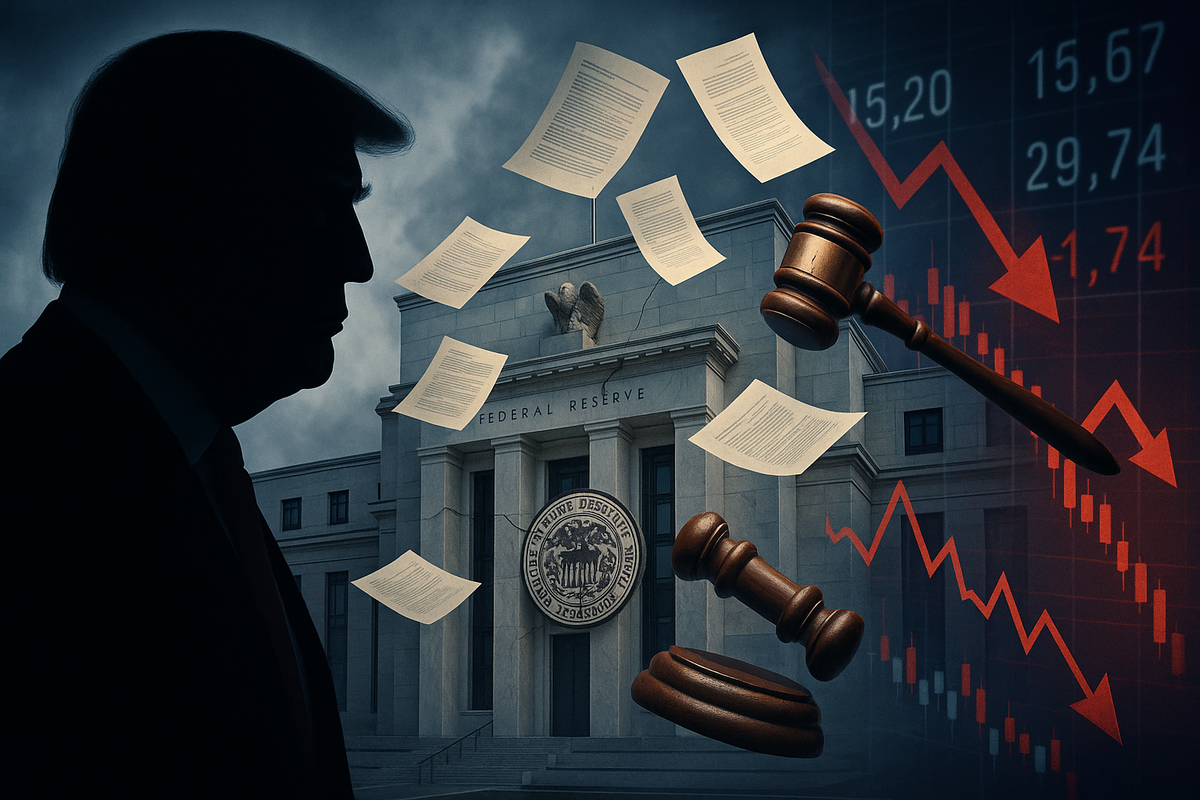
President Donald Trump's unprecedented attempt to dismiss Federal Reserve Governor Lisa Cook has ignited a furious legal battle and sent shockwaves through the financial world, raising grave concerns about the sanctity of the central bank's independence. This direct challenge to the Fed's autonomy, a cornerstone of U.S. economic stability for decades, threatens to politicize monetary policy and inject a new layer of volatility into an already complex global market landscape. The outcome of this high-stakes confrontation could redefine the relationship between the executive branch and the nation's most powerful economic institution.
The dramatic move, announced by President Trump via Truth Social, cited allegations of mortgage fraud against Governor Cook as "for cause" for her immediate removal. However, Cook swiftly denied the charges and launched a lawsuit challenging the President's authority, framing the dismissal as an "unprecedented and illegal" overreach. As legal experts dissect the rarely tested "for cause" clause of the Federal Reserve Act, investors and policymakers alike are bracing for a prolonged constitutional showdown that promises to cast a long shadow over the future direction of U.S. monetary policy and the credibility of its institutions.
An Unprecedented Challenge to Central Bank Autonomy
On Monday, August 25, 2025, President Trump announced via a Truth Social post his immediate decision to remove Federal Reserve Governor Lisa Cook from her post. The President cited allegations of mortgage fraud, specifically that Cook had falsified records to secure favorable loan terms on properties in Michigan and Georgia in 2021, prior to her appointment to the Federal Reserve. A White House spokesperson, Kush Desai, affirmed that the President exercised his "lawful authority" to remove Cook "for cause" due to these "credibly accused" actions.
Governor Cook, a trailblazing economist appointed by President Joe Biden in 2022 and reappointed for a full 14-year term in 2023, vehemently denied the accusations and the legality of her dismissal. She learned of her purported removal through Trump's social media announcement, not official notification, and within hours declared her intent to remain in her position and fight the dismissal in court. By Thursday, August 28, 2025, Cook had filed a lawsuit in federal court in Washington, D.C., seeking an emergency injunction to block her firing, arguing the move was an "unprecedented and illegal attempt" to undermine the Fed's independence. A federal judge has already scheduled a hearing for the case, setting the stage for a landmark legal confrontation.
Key players in this unfolding drama include President Donald Trump, whose long-standing criticisms of the Federal Reserve's monetary policy, particularly its interest rate decisions, are well-documented. On the other side is Governor Lisa Cook, who is fighting to preserve her position and, by extension, the perceived autonomy of the central bank. The allegations against Cook were initially brought forth by William Pulte, a Trump appointee and director of the Federal Housing Finance Agency, and referred to Attorney General Pamela Bondi for investigation, adding another layer of political intrigue. The ultimate arbiter will likely be the U.S. court system, potentially extending to the Supreme Court, which will interpret the rarely tested "for cause" clause within the Federal Reserve Act.
Initial market reactions to the dismissal attempt have been cautious but indicative of underlying concern. The U.S. dollar (USD) "stumbled against other major currencies" immediately following Trump's announcement, reflecting investor apprehension. Economists and industry analysts have widely expressed worry that such direct political interference could disrupt the central bank's operations, leading to economic instability. A primary concern is that a politicized Fed might be pressured to keep interest rates artificially low, potentially fueling inflation and increasing longer-term borrowing costs for consumers and businesses. Investors may demand higher yields on bonds to offset these inflation risks, thereby raising borrowing costs across the entire economy and creating a climate of uncertainty that could deter investment and stifle growth.
The Shifting Sands of Fortune: Potential Winners and Losers
The specter of political interference in the Federal Reserve's independence, should President Trump's dismissal of Governor Lisa Cook be upheld, could dramatically reshape the financial landscape, creating distinct winners and losers across various sectors. The primary driver of these shifts would be a potential deviation from independent, data-driven monetary policy towards decisions influenced by short-term political objectives, most notably regarding interest rates.
Should a more politically compliant Federal Reserve pursue consistently lower interest rates, as President Trump has often advocated, certain sectors could experience a boom. Real estate companies, including major homebuilders like D.R. Horton (NYSE: DHI) and Lennar Corporation (NYSE: LEN), would likely benefit from cheaper mortgages, stimulating housing demand and property development. Similarly, the automotive industry, with giants such as General Motors (NYSE: GM) and Ford Motor Company (NYSE: F), could see increased sales as lower financing costs make car loans more affordable for consumers. Companies reliant on consumer borrowing, from credit card issuers to retailers, might also experience a boost in activity. Additionally, highly leveraged companies, such as some in the private equity sector or those with significant debt loads, could find their borrowing costs reduced, potentially increasing profitability.
Conversely, an erosion of Fed independence and a move towards artificially suppressed interest rates could create significant headwinds for other industries and investors. Banks and financial institutions, including major players like JPMorgan Chase (NYSE: JPM) and Bank of America (NYSE: BAC), often thrive in environments with healthy net interest margins—the difference between what they earn on loans and pay on deposits. Persistently low rates, particularly if driven by political pressure rather than economic fundamentals, could squeeze these margins, impacting their profitability. Fixed-income investors, especially those relying on bond yields for income, would face lower returns, potentially devaluing their portfolios. Furthermore, if politically influenced low rates lead to higher inflation, as many economists fear, companies with high input costs and limited pricing power could struggle to maintain profitability. Utilities and other defensive stocks that typically appeal to income investors might also lose some of their luster if bond yields are suppressed or inflation eros real returns.
The broader market could also face increased volatility and a loss of confidence. Foreign investors, seeking stable and predictable economic environments, might become wary of U.S. markets if the Federal Reserve's independence is compromised. This could lead to capital flight or a reduced appetite for U.S. assets, impacting the U.S. dollar (USD) and potentially raising the cost of capital for all American businesses. Companies heavily involved in international trade could face increased currency risks and reduced competitiveness. Ultimately, the stability and predictability provided by an independent central bank are crucial for long-term investment, and any perceived threat to this autonomy introduces a layer of systemic risk that could broadly penalize growth-oriented companies and those requiring consistent access to capital.
A Precarious Precedent: Industry Impact and Broader Implications
President Trump’s unprecedented attempt to oust Federal Reserve Governor Lisa Cook represents a frontal assault on the bedrock principle of central bank independence, a principle that has underpinned global financial stability for over a century. This event transcends a mere personnel dispute; it signifies a dangerous escalation in the political weaponization of government functions and could irrevocably alter the landscape of U.S. monetary policy and the perception of American economic credibility worldwide. The notion that a President could remove a Fed Governor for reasons perceived as political, rather than clear statutory misconduct, sets a perilous precedent that threatens to subject the central bank’s critical decisions—from interest rates to money supply—to the whims of short-term executive agendas.
The ripple effects of such a dramatic shift would be profound, impacting competitors and partners across the financial ecosystem. Other global central banks, like the European Central Bank (ECB) or the Bank of England (BOE), which also pride themselves on their autonomy, would be watching closely. A perceived weakening of the U.S. Fed's independence could embolden political leaders in other nations to exert similar pressures on their own central banks, potentially leading to a global erosion of central bank autonomy. Domestically, financial markets could become more volatile, as investors would constantly second-guess whether monetary policy decisions are based on economic data or political expediency. This uncertainty could lead to increased risk premiums on U.S. debt, making borrowing more expensive for the government and, by extension, for American businesses and consumers.
Regulatory and policy implications are equally significant. If the dismissal is upheld, it could spur legislative efforts to further define or strengthen the "for cause" clause for Fed Governors, or conversely, lead to executive actions aimed at expanding presidential power over independent agencies. This could open a Pandora's Box, potentially inviting similar political interference into other independent bodies such as the Securities and Exchange Commission (SEC) or the Federal Communications Commission (FCC), thereby undermining their ability to regulate markets and industries impartially. The broader trend it fits into is a growing global challenge to the independence of institutions, often labeled as "populist" attacks on established norms and expert-driven governance.
Historically, comparisons can be drawn, albeit with caveats, to periods when central banks lacked full independence. For example, during the early to mid-20th century in the U.S., the Federal Reserve was often more susceptible to political pressure, particularly during wartime or economic crises, which sometimes led to inflationary spirals or policy missteps. Internationally, countries with less independent central banks often suffer from higher inflation, greater economic volatility, and reduced investor confidence. This current episode harks back to such concerns, suggesting a potential regression from the well-established benefits of an independent central bank. The legal battle over Governor Cook's dismissal is thus not just about one individual or one presidency; it is a critical test of the institutional checks and balances designed to protect the U.S. economy from short-term political opportunism.
The Uncharted Territory Ahead: What Comes Next
The immediate future hinges on the outcome of the legal challenge launched by Governor Lisa Cook. A federal judge has scheduled a hearing, and the case could quickly escalate through the appellate courts, potentially reaching the Supreme Court. Should the courts side with Governor Cook, it would reaffirm the strong constitutional protections for Federal Reserve independence and deliver a significant setback to presidential power over independent agencies. This outcome would likely calm market anxieties surrounding politicized monetary policy and reinforce the current framework of data-driven decision-making. However, if the courts, particularly the Supreme Court, were to uphold President Trump’s interpretation of “for cause,” it would fundamentally alter the balance of power, granting the President unprecedented authority to remove Fed Governors, ushering in a new era of potential political influence over the central bank.
In the short term, irrespective of the legal outcome, the mere attempt to dismiss a Fed Governor introduces a new layer of uncertainty into financial markets. Investors will be closely watching judicial proceedings and any further statements from the White House or the Federal Reserve itself. Companies, particularly those sensitive to interest rate fluctuations or reliant on stable credit markets, will need to assess the implications of potentially more volatile or politically influenced monetary policy. Strategic pivots may include re-evaluating debt structures, hedging against potential inflation spikes, or adjusting investment timelines based on the evolving political and economic landscape.
Looking further ahead, the long-term implications are substantial. If the President gains more control over the Fed, future appointments could be heavily scrutinized for their alignment with the executive branch's economic agenda rather than their expertise or commitment to the Fed's dual mandate of maximum employment and price stability. This could lead to a less diverse and less independent Board of Governors, potentially making the Federal Open Market Committee (FOMC) more susceptible to political pressure. Market opportunities might emerge for sophisticated investors capable of predicting politically driven monetary policy shifts, but overall market stability could suffer. Conversely, challenges would arise for those reliant on a predictable policy environment, and the U.S. dollar's role as the global reserve currency could face increased scrutiny if its underlying monetary policy is perceived as compromised.
Potential scenarios range from a swift judicial repudiation of the President's action, restoring faith in Fed independence, to a protracted legal battle that keeps markets on edge for months. A worst-case scenario might see the President's power affirmed, leading to subsequent removals and appointments that dramatically shift the Fed's policy stance, potentially towards lower rates and higher inflation. In such a scenario, bond markets could experience significant volatility, and inflation-hedging assets might become more attractive. Conversely, a clear judicial victory for Fed independence would reinforce institutional norms and likely lead to a period of reduced uncertainty, allowing the central bank to continue its work without overt political interference. The coming months will be critical in determining which path the U.S. financial system will take.
Conclusion: A Defining Moment for America's Central Bank
President Trump's audacious attempt to dismiss Federal Reserve Governor Lisa Cook represents far more than a political skirmish; it is a defining moment for the independence and credibility of America's central bank. The immediate fallout has plunged the U.S. financial system into a legal and political quagmire, raising fundamental questions about the separation of powers and the sanctity of institutions designed to operate free from partisan influence. The allegations of mortgage fraud against Governor Cook, vehemently denied, serve as the legal pretext, but the broader implication is a challenge to the Fed's long-standing autonomy in setting monetary policy, a cornerstone of economic stability both domestically and globally.
Moving forward, the market's trajectory will be heavily influenced by the swiftness and decisiveness of the judiciary. A robust defense of Fed independence by the courts would offer a crucial reassurance to investors and reinforce the institutional guardrails against executive overreach. Conversely, any judicial outcome that weakens the Fed's autonomy could usher in an era of unprecedented political meddling in monetary policy, potentially leading to increased volatility, higher inflation, and a diminished global standing for the U.S. dollar. The battle over Governor Cook's tenure is a proxy war for the future of central banking in the United States.
For investors, the coming months demand vigilance. Key takeaways include the heightened risk of policy uncertainty and potential inflation should the Fed's independence be compromised. Watch for the progression of Governor Cook's lawsuit and any further statements or actions from the White House or the Federal Reserve. Consider re-evaluating portfolio allocations for increased resilience against potential inflation or interest rate volatility. The outcome of this unprecedented legal and political confrontation will not only determine Governor Cook's fate but also cast a long shadow over the future of U.S. economic governance, making this a critical period for all market participants.






